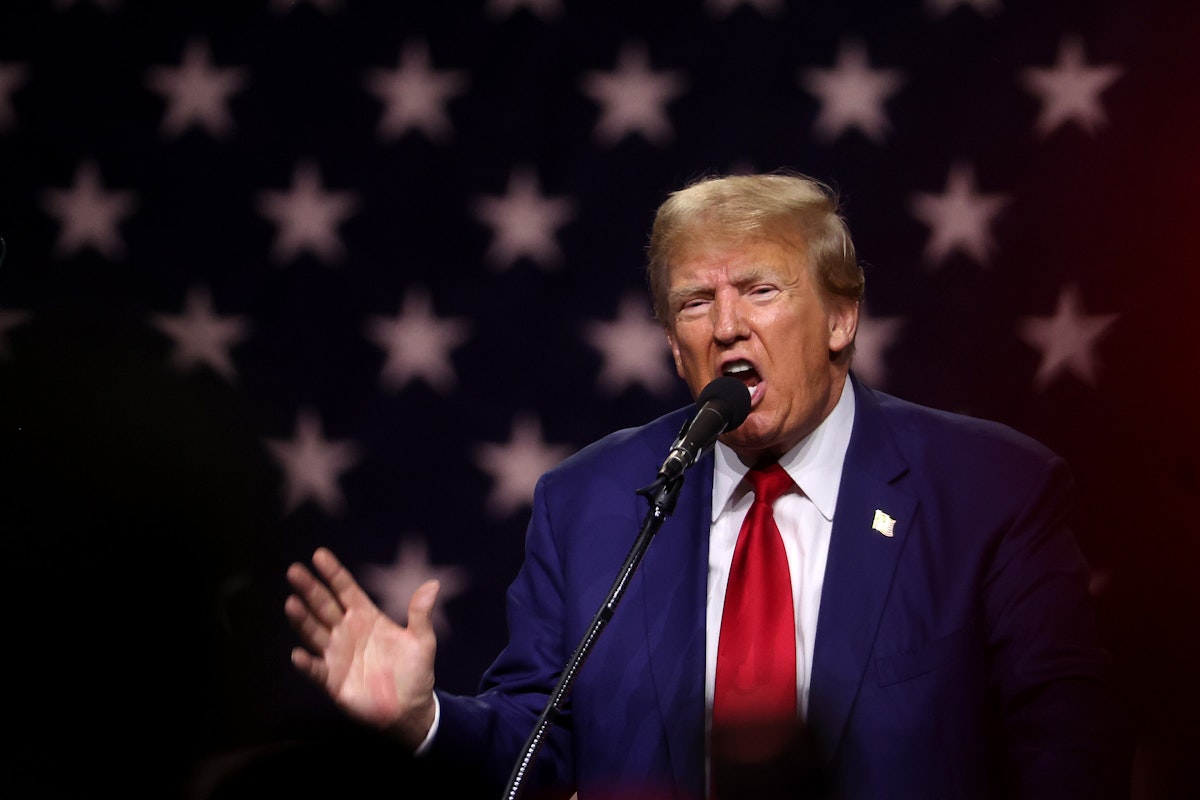This Is Still Fascism—Only Worse
In 2015, Donald Trump infamously launched his first presidential campaign by descending a faux-gilded escalator and saying of undocumented immigrants, “They’re bringing drugs. They’re bringing crime. They’re rapists. And some, I assume, are good people.” More than eight years later, not much has changed—except that Trump has gotten even worse. He now echoes Nazi phraseology in his rhetoric about migrants and avoids any throwaway caveats about “good people.”“They’re poisoning the blood of our country,” he told supporters at a rally on Saturday. “That’s what they’ve done. They poison mental institutions and prisons all over the world, not just in South America, but all over the world. They’re coming into our country, from Africa, from Asia, all over the world.” At another rally a day later, he said, “This is an invasion. This is like a military invasion. Drugs, criminals, gang members, and terrorists are pouring into our country at record levels. We’ve never seen anything like it. They’re taking over our cities.”Trumpworld is planning for an unprecedented show of force against undocumented immigrants if he retakes the White House. Top Trump associates reportedly plan to use the military to close the southern border and round up people for deportation. According to Rolling Stone, between 100,000 and 300,000 troops may be used for the operation, based on questionable legal authority.Such a move would be part of Trump’s “day one” dictatorship, as he himself has described it. Beyond the immigration context, the former president has vowed to weaponize the Justice Department against his political opponents and his critics, declare himself immune from prosecution, and pardon those who carried out a coup attempt on his behalf. In short, Trump is trying to create an electoral mandate for fascism.Some conservatives have argued that there is actually nothing to worry about. Among them is National Review’s Jim Geraghty, who wrote a lengthy column last week titled, “A Reality Check on Trump-as-Dictator Prophecies.” Geraghty says that his longtime readers know that he is “not a supporter of Trump, never voted for him, never will, and find his glaring character flaws, narcissism, erratic judgment, and childish stubbornness outweigh his acts as president that I applauded.”“But I don’t like this argument that Republicans or the electorate at large must reject Trump because if he wins the election, democracy will end, the Constitution will burn, and America will become an autocracy,” he added. He took particular issue with other Never Trump conservatives, such as former Wyoming Representative Liz Cheney, for arguing that the Constitution’s checks and balances might be insufficient to constrain Trump.He conceded that Trump or any other “malevolent president” could “do a lot of damage” solely through the executive branch’s powers. “It is more accurate to say that some believe that our Constitution’s system of checks and balances mitigates or limits the amount of damage that Trump or any other president could do,” Geraghty added. He argued that even a Republican-led Congress could constrain Trump since it largely ignored him during his first term.There are good reasons to think that wouldn’t hold true next time. For one thing, Trump’s influence over the GOP is substantially greater in 2024 than it was in 2016. Speaker Paul Ryan was not a true believer in the MAGA cause; Speaker Mike Johnson is one. Trump has spent almost eight years purging moderates and dissenters from the GOP congressional ranks, resulting in a congressional coalition that is more willing to carry out his instructions than ever.What about the courts? Even here, Geraghty admits Trump could simply ignore them. “I don’t have a crystal ball; Trump could well trigger a constitutional crisis by openly defying a Supreme Court ruling,” he wrote. “But if that Supreme Court ruling was about the actions of a federal agency, a fair question is whether everyone who works at that federal agency is willing to act in defiance of the court.” He cited examples where federal agencies largely ran on autopilot during the Trump years.Again, that assumes that Trump and his allies haven’t learned from previous experience. We know from ample reporting at this point that top Trump advisers are planning to carry out a legally dubious overhaul of the federal civil service. If they staff it with cronies and purge it of dissenters, there is little reason to believe that federal agencies would actually defy Trump—and plenty of reason to believe they could join him in defying the Supreme Court.Geraghty took the greatest issue with claims that Trump could use the military to oversee and undermine future elections. Not because he thinks Trump wouldn’t try to do that, of course. Michael Flynn, Trump’s former national security adviser, tried to persuade the Department of Defense to help promote voter-fraud conspiracy theories in 2020, and proposed letting the military “rerun” the election that Tr

In 2015, Donald Trump infamously launched his first presidential campaign by descending a faux-gilded escalator and saying of undocumented immigrants, “They’re bringing drugs. They’re bringing crime. They’re rapists. And some, I assume, are good people.” More than eight years later, not much has changed—except that Trump has gotten even worse. He now echoes Nazi phraseology in his rhetoric about migrants and avoids any throwaway caveats about “good people.”
“They’re poisoning the blood of our country,” he told supporters at a rally on Saturday. “That’s what they’ve done. They poison mental institutions and prisons all over the world, not just in South America, but all over the world. They’re coming into our country, from Africa, from Asia, all over the world.” At another rally a day later, he said, “This is an invasion. This is like a military invasion. Drugs, criminals, gang members, and terrorists are pouring into our country at record levels. We’ve never seen anything like it. They’re taking over our cities.”
Trumpworld is planning for an unprecedented show of force against undocumented immigrants if he retakes the White House. Top Trump associates reportedly plan to use the military to close the southern border and round up people for deportation. According to Rolling Stone, between 100,000 and 300,000 troops may be used for the operation, based on questionable legal authority.
Such a move would be part of Trump’s “day one” dictatorship, as he himself has described it. Beyond the immigration context, the former president has vowed to weaponize the Justice Department against his political opponents and his critics, declare himself immune from prosecution, and pardon those who carried out a coup attempt on his behalf. In short, Trump is trying to create an electoral mandate for fascism.
Some conservatives have argued that there is actually nothing to worry about. Among them is National Review’s Jim Geraghty, who wrote a lengthy column last week titled, “A Reality Check on Trump-as-Dictator Prophecies.” Geraghty says that his longtime readers know that he is “not a supporter of Trump, never voted for him, never will, and find his glaring character flaws, narcissism, erratic judgment, and childish stubbornness outweigh his acts as president that I applauded.”
“But I don’t like this argument that Republicans or the electorate at large must reject Trump because if he wins the election, democracy will end, the Constitution will burn, and America will become an autocracy,” he added. He took particular issue with other Never Trump conservatives, such as former Wyoming Representative Liz Cheney, for arguing that the Constitution’s checks and balances might be insufficient to constrain Trump.
He conceded that Trump or any other “malevolent president” could “do a lot of damage” solely through the executive branch’s powers. “It is more accurate to say that some believe that our Constitution’s system of checks and balances mitigates or limits the amount of damage that Trump or any other president could do,” Geraghty added. He argued that even a Republican-led Congress could constrain Trump since it largely ignored him during his first term.
There are good reasons to think that wouldn’t hold true next time. For one thing, Trump’s influence over the GOP is substantially greater in 2024 than it was in 2016. Speaker Paul Ryan was not a true believer in the MAGA cause; Speaker Mike Johnson is one. Trump has spent almost eight years purging moderates and dissenters from the GOP congressional ranks, resulting in a congressional coalition that is more willing to carry out his instructions than ever.
What about the courts? Even here, Geraghty admits Trump could simply ignore them. “I don’t have a crystal ball; Trump could well trigger a constitutional crisis by openly defying a Supreme Court ruling,” he wrote. “But if that Supreme Court ruling was about the actions of a federal agency, a fair question is whether everyone who works at that federal agency is willing to act in defiance of the court.” He cited examples where federal agencies largely ran on autopilot during the Trump years.
Again, that assumes that Trump and his allies haven’t learned from previous experience. We know from ample reporting at this point that top Trump advisers are planning to carry out a legally dubious overhaul of the federal civil service. If they staff it with cronies and purge it of dissenters, there is little reason to believe that federal agencies would actually defy Trump—and plenty of reason to believe they could join him in defying the Supreme Court.
Geraghty took the greatest issue with claims that Trump could use the military to oversee and undermine future elections. Not because he thinks Trump wouldn’t try to do that, of course. Michael Flynn, Trump’s former national security adviser, tried to persuade the Department of Defense to help promote voter-fraud conspiracy theories in 2020, and proposed letting the military “rerun” the election that Trump lost. Geraghty instead argued that the military just wouldn’t do that.
“I just don’t see our men and women in uniform as mindless automatons who will obey whatever orders Trump gives them, no matter how self-evidently unlawful or in defiance of the Constitution they are,” Geraghty wrote. “Nor do I see the men and women of America’s law enforcement that way. Yes, you can find bad apples in both groups. But I just don’t think that the entire military and all the law-enforcement agencies of the U.S. government will nod and go along with an effort to end 250 years of constitutional limits on the power of the president.”
This does not actually disprove anyone’s concerns. At best, it leans entirely on unsubstantiated hope. At worst, it is a weird attempt to ignore the question by claiming that anyone raising it is insufficiently reverent of the American military. And while American soldiers are not bound to obey illegal or unconstitutional orders, defiance on that scale would also likely weaken civilian control of the military. At that point, you’re just hoping to stop one constitutional crisis by starting another.
This is something of a theme in Geraghty’s column. Despite his professed opposition to Trump, he can’t resist drawing false equivalences with Trump’s opponents. At one point, he describes Biden as “another guy running for president who has also been willing to ignore the Constitution when it proved inconvenient.” His linked source for that claim is Biden’s student debt relief order, which was overturned by the Supreme Court without incident last year. Geraghty also observed that Trump “isn’t the first major public figure to yearn for temporary autocracy,” quoting something New York Times columnist Thomas Friedman said about China on Meet the Press in 2010. That is just unserious.
Some issues in American politics are complicated and nuanced. This is not one of them. Trump, the great clarifier, isn’t campaigning on reducing the national debt or expanding free school lunch programs. His platform is that he will shrug off any constraints on his power to govern however he sees fit if he wins the presidential election next year. His promise of a “day one dictatorship” is a toe dip into pure authoritarianism, a way to normalize his anti-constitutional impulses and yoke the rest of the Republican Party to them. To deny that Trump is seeking this outcome at this point is to help him make it possible.


